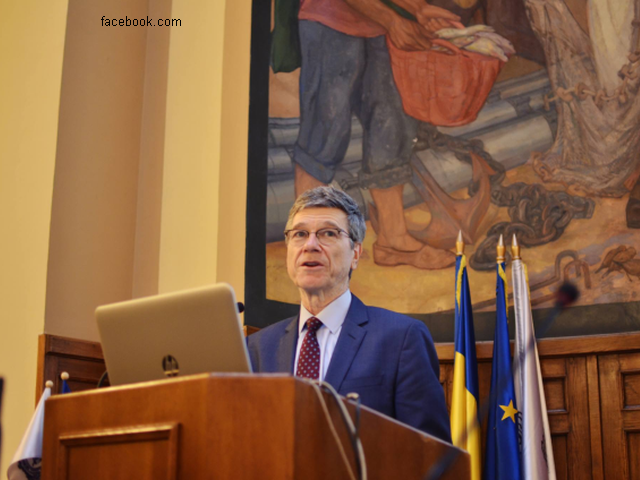Is the world economy facing a new crisis?
Jeffrey Sachs, on a visit to Bucharest, makes an X-ray of the world economy
Warning: Trying to access array offset on null in /home/web/rri.ro/public/wp-content/themes/rri/template-parts/content.php on line 53

Warning: Trying to access array offset on null in /home/web/rri.ro/public/wp-content/themes/rri/template-parts/content.php on line 98
Corina Cristea,
23.03.2018, 12:31
More than a decade after the outbreak of the
world economic crisis, which forced the world’s biggest economies and the
European Union as a whole to test their reaction capacity and manage an
exceptional situation, the renowned American professor Jeffrey Sachs traveled to Bucharest at the invitation of the Romanian authorities, where he made an
X-ray of the world economy. In his opinion, these are some good times for the
world economy, and a new crisis in the near future can only be generated by the
political leaderships of the world’s states and not for reasons that have to do
with the economy: If there is a crisis coming, it’s
because of bad leadership. There’s no reason for a crisis right now. All of the
major regions, the US, Europe, China, India, are doing fine.
In other words, the world economy is looking well, but it
all depends on the decisions made by the world leaders. The US is in a
situation in which its economy is growing but its population is not doing any
better. The population’s living standards have been dropping by the year,
people are unhappy and life expectancy rates are also dropping, said professor
Sachs, who is known for his criticism of Donald Trump. In his opinion, economic
crises are the result of pursuing the wrong policies, and there is a clear
danger of that happening at the moment.
On the other hand, says professor Sachs, there is a
positive and interesting global economic agenda that includes the use of new
technologies to create more prosperity, end poverty and create a world economy
based on renewable energy. He says the GDP indicator no longer reflects
accurately what is happening in the economy and in society, such as air
pollution and quality of life in general. Professor Sachs says economic growth
can simply be confiscated by a handful of people or companies. He stresses that
what’s important is people’s lives and prosperity and urges countries to
cooperate and ask themselves what kind of world they want to live in and
whether they want to live on a planet of peace, prosperity and sustainable
development. He says our political action must be centred on the world we wish
to create.
Considered one of the most important international experts
in the fields of economic development and poverty reduction, professor Sachs
has urged Romania to plead for a strong European Union, to remain an open
economy and to increase its investments and channel them into sustainable
development projects: Romania needs a strong public and
private investment effort, it needs that investment to be in the direction of
sustainable development, meaning renewable energy, advanced technologies,
movement towards electric vehicle, for example, as a basic new area of
priority, sustainable infrastructure with a good connectivity, of course
maintaining a long-term fiscal policy which enables this long-term investment.
In today’s modern economy, the key to long-term development includes a good-skilled
workforce, excellent universities, linkages between business and universities
and openness to foreign partners and foreign investors who helped to create
international markets. So from Romania’s point of view, in thinking about
regional development, I think it would be important to ask the questions about
regions, what kind of skilled development, what kind of infrastructure, what
kind of links with international markets, what kind of success in attracting
foreign investment partners and what should be done in public policy to ensure
that all regions can benefit.
From the standpoint of business leaders in Romania, Romania’s economic growth model,
largely based on consumption, is not quite appropriate. A recently-published
specialized survey has shown that more than 90% of them share this opinion. As
for Romanian companies, 85% of them see their investments plans in jeopardy,
because of fiscal uncertainty, according to the research carried by the Ernst&Young
Romania.
With details on that, here is the research coordinator with the
aforementioned institution, Mihaela Matei: The main conclusion pertains to a general atmosphere of suspicion and
concern on the part of organization leaders in Romania regarding this year’s
economic growth, the growth model based on an increase in consumption and the
country strategy. In effect, 99% of the respondents would like the country
strategy to be based on sustainable economic growth and would like the
structural gaps between Romania and the Western European countries bridged
IMF experts have also come to Bucharest and
recommended a balanced mix of monetary and fiscal policies and support for
investments, so that last year’s growth rhythm be maintained. The IMF
representatives have underscored the relevance of having an improved budget
collection system and of maintaining public spending within sustainable limits.
The Romanian government estimates an 6.1 % economic growth rate in 2018, based
on investments, mostly from European funds.





























